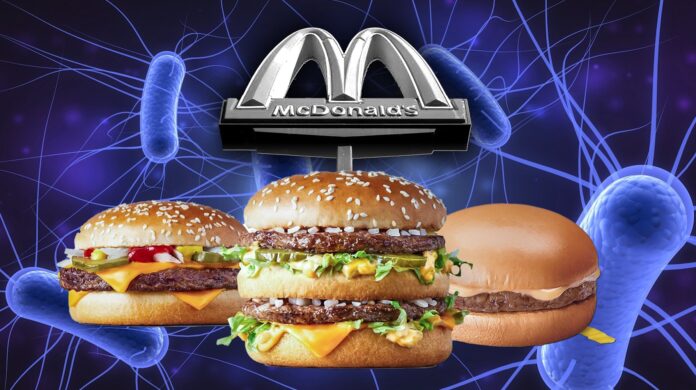A significant E. coli outbreak has been linked to McDonald’s Quarter Pounder hamburgers, sickening dozens across the U.S., particularly in Colorado and Nebraska, with one reported death. The U.S. Centers for Disease Control and Prevention (CDC) confirmed that 26 cases have been identified in Colorado alone, with a total of 10 hospitalizations. Among the hospitalized is a child suffering from complications of Hemolytic Uremic Syndrome (HUS), a condition that can cause deadly blood clots. Tragically, one elderly individual with underlying health conditions in Colorado has died as a result of the infection.
The outbreak, which occurred between September 27 and October 11, has been tied to McDonald’s products, with all affected individuals reporting that they had eaten at McDonald’s before falling ill. Most of these cases involved customers who had eaten Quarter Pounders, leading health officials to focus their investigation on this specific menu item. The E. coli strain responsible for the outbreak is O157:H7, a particularly virulent form of the bacteria, which can cause severe gastrointestinal symptoms such as stomach cramps, diarrhea, and vomiting, and in more serious cases, lead to HUS.
In response to the outbreak, McDonald’s has taken decisive steps to mitigate the situation. The company temporarily pulled Quarter Pounders from its restaurants in affected states, including Colorado, Kansas, Nebraska, and parts of surrounding states like Wyoming, Utah, and Idaho. Additionally, McDonald’s identified slivered onions as the likely source of contamination and removed them from its supply chain. The fast-food giant is working closely with suppliers and health authorities to address the situation and ensure food safety moving forward.
The outbreak has already had financial repercussions for the company, with McDonald’s shares dropping more than 10% in post-market trading before recovering slightly. Citigroup analyst Jon Tower emphasized that how McDonald’s manages the crisis will be critical to maintaining investor confidence, as food safety issues can have long-lasting impacts on restaurant chains. Tower advised the company to take strong actions to control the outbreak, accept responsibility, and invest in enhanced food safety measures to avoid further damage to its brand image.
The CDC has warned that the true number of infections may be much higher, as many individuals recover without seeking medical testing, and it can take weeks to confirm if a person is part of an outbreak. In addition, the scope of the outbreak may expand, as some cases are still under investigation. The U.S. Food and Drug Administration (FDA) has also launched its own probe into the source of the contamination, preliminarily identifying slivered onions as the most likely culprit. Investigators are working to confirm whether these onions were supplied to other restaurants or businesses, potentially broadening the investigation.
This is not the first time a fast-food chain has been embroiled in a major foodborne illness outbreak. In 2015, Chipotle Mexican Grill faced a series of E. coli and norovirus outbreaks across multiple states, which resulted in a steep decline in sales and hefty fines. More recently, in 2022, Wendy’s lettuce was linked to a series of E. coli infections in the U.S. Midwest. These incidents serve as a reminder of the serious consequences that can arise when food safety protocols are compromised, and the critical importance of swift, transparent action from companies to protect public health.
The investigation is ongoing, and McDonald’s is cooperating fully with the CDC and FDA to ensure that the contaminated products are removed and that similar incidents do not occur in the future.




